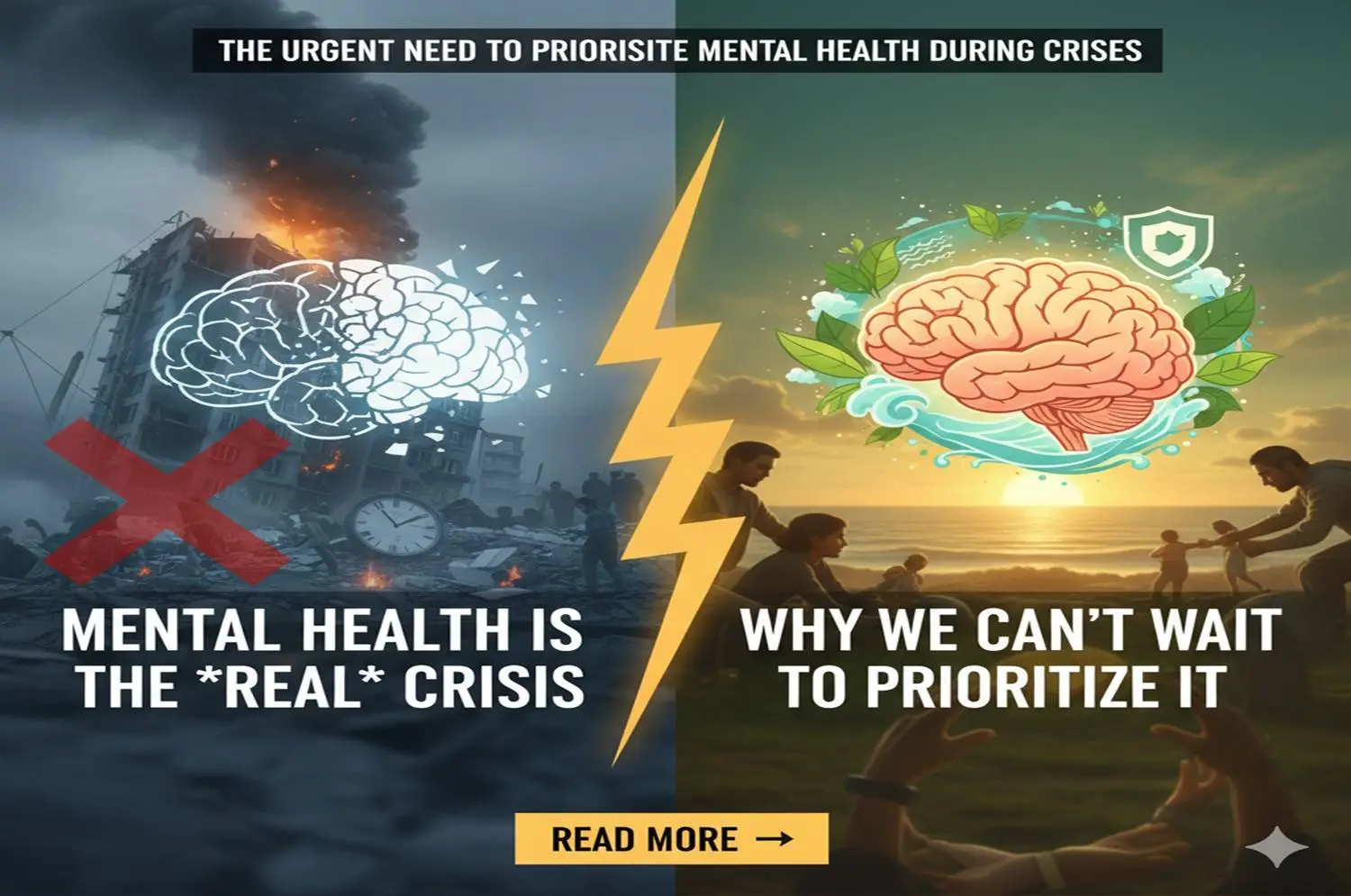When disaster strikes—whether it’s a flood, conflict, or public health emergency—our first thoughts often go to survival: food, shelter, and safety. But what about our emotional survival? Mental health often becomes the silent casualty of crises, quietly eroded by fear, uncertainty, and trauma.
This year’s World Mental Health Day (October 10, 2025) brings attention to this often-overlooked issue with the theme “Access to Services: Mental Health in Catastrophes and Emergencies.” It’s a timely reminder that mental wellbeing is not a luxury—it’s a necessity, especially in times of crisis.
According to the World Health Organization (WHO), crises such as wars, natural disasters, and pandemics cause emotional distress for millions. Research shows that 1 in 5 people who have lived through war or conflict in the past decade experience conditions like depression, anxiety, post-traumatic stress disorder (PTSD), bipolar disorder, or schizophrenia. And yet, mental health support often remains an afterthought in emergency response plans.
Why Mental Health Should Be a Priority in Crises
When people lose homes, loved ones, or a sense of safety, their mental wellbeing takes a direct hit. In such moments, emotional pain can be just as real—and debilitating—as physical injuries.
“Being mentally healthy is essential for coping with any catastrophic situation,” say mental health experts. The ability to think clearly, make decisions, and stay resilient depends largely on our mental state. Without psychological support, survivors of crises may struggle long after the physical danger has passed.
Consider this: after natural disasters like earthquakes or floods, we often see communities rebuild infrastructure. But rebuilding mental resilience is just as crucial. Depression, anxiety, and trauma can linger, making it harder for people to recover, reconnect, and rebuild their lives.
The Global Picture: A Growing Crisis
With climate change, political conflicts, and public health emergencies on the rise, mental health challenges are multiplying worldwide. People forced to flee their homes face chronic stress, uncertainty, and fear about the future. Healthcare workers, too, often suffer burnout and emotional exhaustion while helping others.
Experts warn that if mental health services aren’t integrated into emergency response systems, the long-term psychological cost will be enormous. This is why the World Mental Health Day 2025 theme focuses on ensuring that emotional care is accessible to everyone—especially those in crisis zones.
What Can Help: Building Emotional Resilience
The good news? With the right support, people can and do recover from trauma. Here’s what psychologists recommend for managing mental health during crises:
1. Acknowledge the Emotional Impact
It’s okay to not feel okay. Recognizing distress is the first step toward healing. Suppressing emotions or pretending to “stay strong” often makes recovery harder. Talking about what you’re feeling—whether to a friend, family member, or counselor—can help release the weight you’re carrying.
2. Create a Sense of Safety and Routine
When the world feels chaotic, small routines can restore a sense of control. Eating regular meals, maintaining hygiene, and setting aside time to rest—even in uncertain situations—can make a big difference.
3. Reach Out for Help
If you or someone you know is struggling with sleep problems, intrusive thoughts, or intense anxiety, professional help is crucial. Many organizations now offer teletherapy and crisis helplines to make mental health care more accessible, even in emergencies.
4. Community Support Matters
After a crisis, social connections are one of the strongest buffers against trauma. Joining community support groups, volunteering, or simply spending time with others who understand your experience can help you process emotions and find meaning again.
5. Mind-Body Techniques
Simple practices like deep breathing, grounding exercises, and mindfulness can help regulate stress responses. They bring attention back to the present moment, helping the body and mind recover from prolonged tension.
Why October 10 Is World Mental Health Day
Every year, World Mental Health Day is observed on October 10 to raise global awareness about mental health issues and mobilize efforts in support of better care. Started by the World Federation for Mental Health in 1992 and supported by WHO, this day encourages open conversations around mental wellbeing—reminding us that mental health is just as important as physical health.
Looking Ahead: Making Mental Health a Core Part of Crisis Response
If there’s one takeaway from World Mental Health Day 2025, it’s this: mental health services are not optional during crises—they are lifesaving. Governments, NGOs, and communities need to ensure that psychological first aid is as available as food, water, and medical care.
Building a world that prioritizes mental health access in catastrophes and emergencies means training responders to recognize signs of distress, providing safe spaces for emotional recovery, and funding long-term mental health programs for survivors.
As we navigate an era of increasing global instability, mental health care must become a cornerstone of humanitarian aid. Without it, recovery remains incomplete.
Read more:










1 thought on “The Urgent Need to Prioritise Mental Health During Crises”